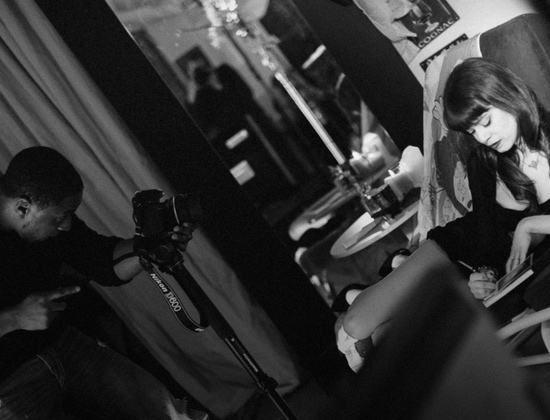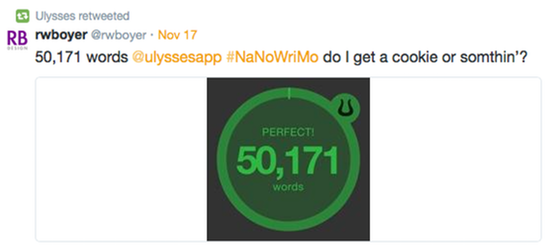Robert W. Boyer Was Possibly the First to Win NaNoWriMo 2014
On November 17, 2014 you hit the 50,000 words goal for this year’s NaNoWriMo. We know, because you used Ulysses’ goal feature to share your word count. Many writers are struggling to get there by November 30, if they succeed at all. How did you do it?
I’ve toyed with the idea of committing to NaNoWriMo the past few years, but I’m scared of commitment. When I make one I keep it, damn the torpedoes, never mind the collateral damage. This year I decided to commit.
Short answer is butt in chair, hands on keyboard. Don’t wait for a good day, or a mood, just start typing, even when it feels horrid, even when your voice sounds lousy in your own head, just start moving.
What is your novel about?
The synopsis as written on my NaNoWriMo novel summary page: A case of mistaken identities, confused hit-men, a bad guy that’s actually a good guy, some southern style happenstance, and a jaded protagonist that has more luck than skill.
When I make a commitment I keep it,
never mind the
collateral damage.
Southern as in south-eastern US. That’s the quick hit and sums up the surface of the story. A thriller/suspense if I must pigeonhole it somewhere. The story’s got a dash of underlying commentary about victims. There are no victims, only perpetrators, conversely every character is a victim and a victimizer. Even the guy that stepped into the path of a bullet, the bystander killed at the beginning of the story isn’t a victim. He was rude and spilled the protagonists coffee passing by. Not that it justifies getting shot, but it lead to wrong-place wrong-time. The rest of the characters just want to survive, or profit, or both.
Where did the story come from, what were your inspirations?
It’s random. I have no lack of ideas for stories, I don’t lack the energy to tell them. I lack the discipline to write the stories, then finish them, then polish them. Ask anybody that’s ever been in a car with me. Even a short trip I’ll bewilder with questions, then I’ll make up answers, complete nonsense based on a street sign or a billboard.
Just take the working title, Red Mist. I think I bit my lip in late October; the blood had that taste that blood has, metallic iron with a dash of coppery-ness. I thought, I wonder when someone gets shot right in front of you, can you taste that in the air, like ozone after rain hits hot concrete? When that happened, I asked who was that guy, who tasted that. That opened chapter one, the guy that tasted the blood spray in the air. He’s now one of my protagonists.

Now that you’ve got the 50,000 – are you done?
Not close; the first draft is shaping up to be 80,000 or 90,000 words. My real goal for November is that first draft. Not the word count but the whole story, the whole first draft down on paper. I may finish on November 30, maybe December 13 – I don’t know. But I will finish the first draft, and I will do it by writing every day until I do.
What are you going to do with your novel when November is over?
I’ll shove the first draft in a drawer, then read it in January. My plan is a multi-pass edit. First pass for large chunks, fixing plot points, rearranging scenes, any major tone re-writes or changing a scene’s point of view. After that I’ll polish the prose, make the dialog really work hard. Then the proof-read will happen last. I’m not at all concerned with minor nits or past perfect tense until I get to the second or third pass. It’s all story and feel until then. That will be my second draft. Where it goes from there will depend on how I feel about it with distance and polish. If I take it farther, I’ll need an editor.
Plotter or Pantser?
With too much planning
I’d end up writing a story
I don’t feel like writing.
A strange mix of both. Let’s say I’m more a strategist with good tactical awareness. Two days before November 1st I laid out a dozen scenes. Let’s call them markers for plot points translated into scenes of what had to happen in a general sequence beginning to end. For some of those scenes there were hundreds of ideas to get from one to the other. Other scenes I had no idea how to get there. Four characters were loosely profiled before I started. One protagonist, gave him a name, a background — more a personality, occupation, and mindset rather than a CV. Same thing for the antagonist, the other two were minor characters at that time.
As writing started, putting scenes behind me between those I chucked out there, the characters evolved, they came to life on their own. Questions came up, for myself, and for my characters, it is hard to tell the difference. New scenes came about, some of the original scenes were deleted or replaced with a new version. Having some overarching strategy providing guidance on what hill needs to be taken is enough. If I hem myself in with too much planning I’ll end up writing a story I don’t feel like writing. If that happens the story will never get finished. I like to have leeway, space to maneuver.
What’s your advice for dealing with a writer’s block?
Get over it. That’s my advice in a nutshell. Just write something, it will take you somewhere. Blow up your story on purpose, blow something up literally. Have one of your characters choke on a pork chop bone. Have another character say something like, “thought that only happened with chicken bones and dogs”. I’m not saying that scene will stay, I will assure you that it will take you somewhere and you can veer off into something that feels right.
Writer’s block? Get
over it. That’s my advice
in a nutshell.
If you’re spending more time not writing and thinking about why you’re not writing that is the enemy. Somedays it takes ten minutes to write the first line of a scene. It’s painful, very painful, but it goes away. Here’s something to try: Don’t open the scene, somedays I find opening a new scene excruciating. Just start it in the middle somewhere.
You’ve been using Ulysses for a while. Would you suggest it to other novelists, and why?
Ulysses III is the closest thing to a notebook, blank paper, and a really good assistant/intern out there. A big notebook with infinite sheets that you can reorganize over and over. It’s just enough but not too much. Almost the Goldilocks kind of just right. I do have just a couple of things I would love to see — how about just a few criteria like “does not include” for library filters? Please?
Do you have one or two writing tips you would like to share with desperate wrimos out there?
Focus on the story. Make the story the only thing. Don’t worry too much about overly flowery prose at this point. Don’t waste time finetuning dialog. Don’t ask yourself endless questions before the story is done about active voice or verb tense. All of those things come later in a second or third draft. None of them means a thing without the story.
Robert W. Boyer, based at Chesapeake Bay, Maryland, USA, studied Physics, Computer Sciene and Mathematics and led a truly turbulent life. He was a “street racer, heavy metal guitarist, software developer, idiotically large scale technology project executive and commercial photographer”, to name only a couple of the professions he worked in. When growing up he wanted to be a pirate – “like Captain Jack Sparrow, not the Somali kind”.
